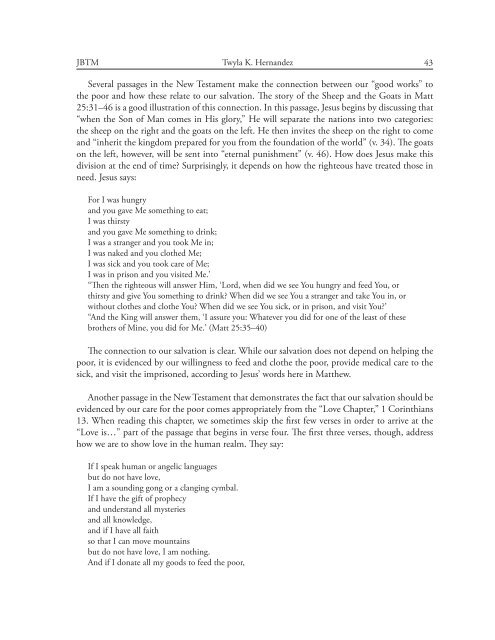JBTM_10-2_Fall_2013
JBTM_10-2_Fall_2013
JBTM_10-2_Fall_2013
You also want an ePaper? Increase the reach of your titles
YUMPU automatically turns print PDFs into web optimized ePapers that Google loves.
<strong>JBTM</strong><br />
Twyla K. Hernandez<br />
43<br />
Several passages in the New Testament make the connection between our “good works” to<br />
the poor and how these relate to our salvation. The story of the Sheep and the Goats in Matt<br />
25:31–46 is a good illustration of this connection. In this passage, Jesus begins by discussing that<br />
“when the Son of Man comes in His glory,” He will separate the nations into two categories:<br />
the sheep on the right and the goats on the left. He then invites the sheep on the right to come<br />
and “inherit the kingdom prepared for you from the foundation of the world” (v. 34). The goats<br />
on the left, however, will be sent into “eternal punishment” (v. 46). How does Jesus make this<br />
division at the end of time? Surprisingly, it depends on how the righteous have treated those in<br />
need. Jesus says:<br />
For I was hungry<br />
and you gave Me something to eat;<br />
I was thirsty<br />
and you gave Me something to drink;<br />
I was a stranger and you took Me in;<br />
I was naked and you clothed Me;<br />
I was sick and you took care of Me;<br />
I was in prison and you visited Me.’<br />
“Then the righteous will answer Him, ‘Lord, when did we see You hungry and feed You, or<br />
thirsty and give You something to drink? When did we see You a stranger and take You in, or<br />
without clothes and clothe You? When did we see You sick, or in prison, and visit You?’<br />
“And the King will answer them, ‘I assure you: Whatever you did for one of the least of these<br />
brothers of Mine, you did for Me.’ (Matt 25:35–40)<br />
The connection to our salvation is clear. While our salvation does not depend on helping the<br />
poor, it is evidenced by our willingness to feed and clothe the poor, provide medical care to the<br />
sick, and visit the imprisoned, according to Jesus’ words here in Matthew.<br />
Another passage in the New Testament that demonstrates the fact that our salvation should be<br />
evidenced by our care for the poor comes appropriately from the “Love Chapter,” 1 Corinthians<br />
13. When reading this chapter, we sometimes skip the first few verses in order to arrive at the<br />
“Love is…” part of the passage that begins in verse four. The first three verses, though, address<br />
how we are to show love in the human realm. They say:<br />
If I speak human or angelic languages<br />
but do not have love,<br />
I am a sounding gong or a clanging cymbal.<br />
If I have the gift of prophecy<br />
and understand all mysteries<br />
and all knowledge,<br />
and if I have all faith<br />
so that I can move mountains<br />
but do not have love, I am nothing.<br />
And if I donate all my goods to feed the poor,


